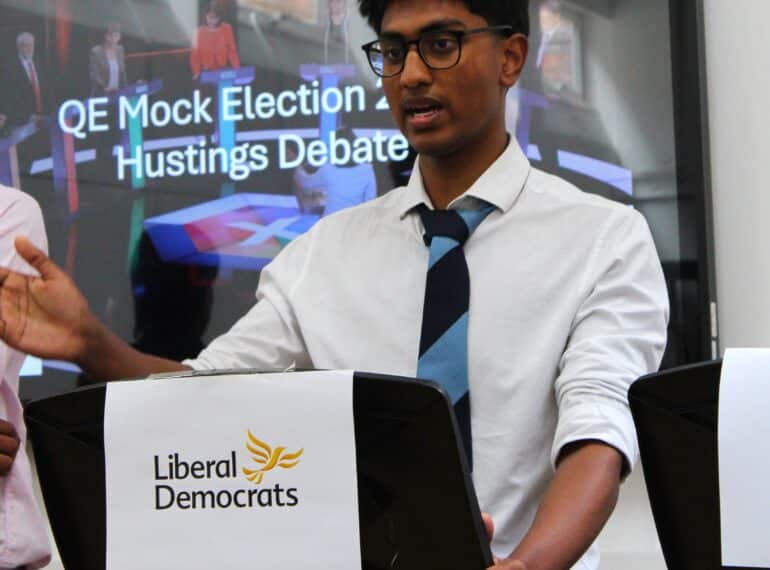
While the country woke up on Friday to news of a Labour landslide in the General Election, at QE the political landscape looks very different, though still with scant consolation for the Conservatives.
 In the School’s mock election, the Liberal Democrats emerged as easily the biggest party, with 21 of the 46 seats in QE’s parliament.
In the School’s mock election, the Liberal Democrats emerged as easily the biggest party, with 21 of the 46 seats in QE’s parliament.
However, since he has no overall majority, the Lib Dems’ Ayaad Salahuddin has already struck a deal with Labour’s Shrey Verma, in second place, so that he can form a coalition government.
Headmaster Neil Enright said: “The mock election seeks to build awareness of the democratic process and get pupils engaged with campaigns, debates, polling and voting. My congratulations go to all the candidates for engaging so enthusiastically in the election process and especially to Ayaad on his victory.”
 The run-up to the mock election included a hustings, where parties made their pitches and fielded questions from the audience. All the candidates were drawn from Year 12.
The run-up to the mock election included a hustings, where parties made their pitches and fielded questions from the audience. All the candidates were drawn from Year 12.
The boys have also been informed by visits in recent months of real politicians from all three leading parties. These were: Sir Vince Cable (former Liberal Democrat Leader and Business Secretary in the Coalition Government); Lord Michael Heseltine (former Conservative Deputy Prime Minister and long-serving Cabinet minister), and Labour’s parliamentary candidate (now new Chipping Barnet MP) Dan Tomlinson, following a previous visit from then local MP Theresa Villiers (Conservative).
Whereas in the country at large, the predictions of the exit poll proved quite accurate, at QE the story was very different: pre-election polling suggested the Conservatives would win, comfortably ahead of Labour, with the Liberal Democrats third. The actual result completely reversed this, giving the Lib Dems 21 seats, Labour 13 and the Conservatives only 7.
John Haswell, Acting Head of History & Politics, said: “The Lib Dems at QE ran a very successful social media campaign and built strong support among the younger year groups, where turnout was also higher.”
 In fact, turnout among Year 7 was easily the highest, at almost 80%. Only small numbers of Year 11 cast votes, having recently completed their GCSEs, while Year 13 have already left (and no postal votes were available). One seat was allocated for each of the 46 forms in the School, excluding forms in Year 13.
In fact, turnout among Year 7 was easily the highest, at almost 80%. Only small numbers of Year 11 cast votes, having recently completed their GCSEs, while Year 13 have already left (and no postal votes were available). One seat was allocated for each of the 46 forms in the School, excluding forms in Year 13.
In contrast to the overall School result, Year 12 gave strong backing to independent candidate Ayan Basharat.
The results were:
- Ayaad Salahuddin – Liberal Democrats – 21 seats (45.6%)
- Shrey Verma – Labour – 13 seats (28.3%)
- Uday Dash – Conservatives – 7 seats (15.2%)
- Arjun Mistry – Green Party – 3 seats (6.5%)
- Rohan Varia – Reform Party – 1 seat (2.2%)
- Ayan Basharat – Independent – 1 seat (2.2%)

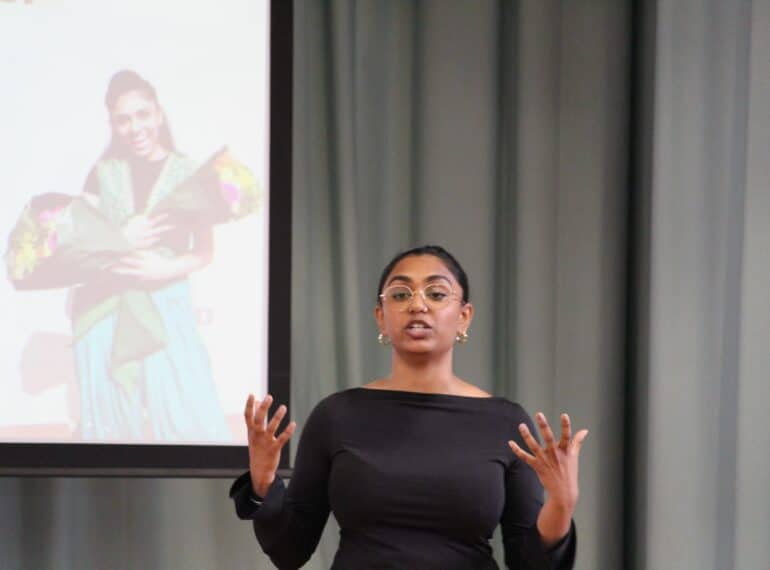
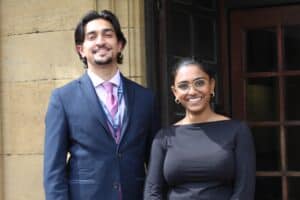 Still aged only 24, Neetu founded Haldi, a collective for South Asian artists, while an English Literature undergraduate at Oxford and is now studying towards a Master’s in Creative Writing at Cambridge.
Still aged only 24, Neetu founded Haldi, a collective for South Asian artists, while an English Literature undergraduate at Oxford and is now studying towards a Master’s in Creative Writing at Cambridge.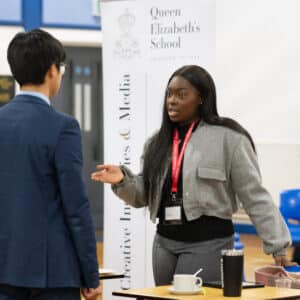 She came to the School as part of QE Futures – a programme launched this year which aims to guide every pupil towards competitive degree-level university or apprenticeship courses and then to help them thrive both at university and beyond.
She came to the School as part of QE Futures – a programme launched this year which aims to guide every pupil towards competitive degree-level university or apprenticeship courses and then to help them thrive both at university and beyond.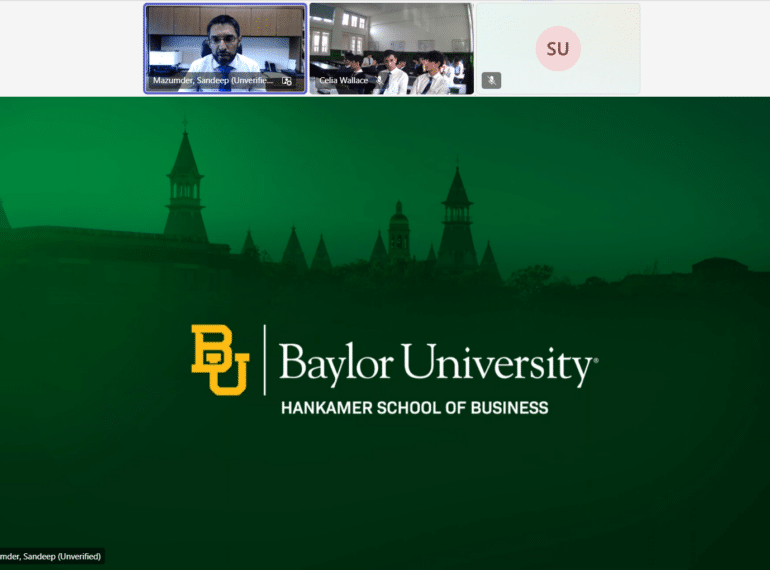
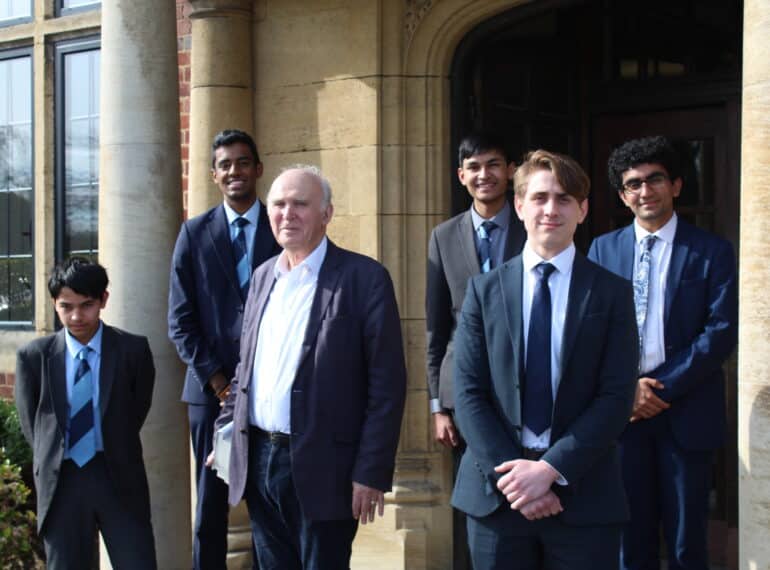
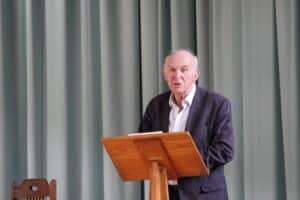 His afternoon visit to QE was led by the society’s Rishabh Bhatt, of Year 12. Before taking questions from an audience drawn from all year groups in the Main School Hall, he gave some brief advice to any aspiring politicians. They should understand the importance of:
His afternoon visit to QE was led by the society’s Rishabh Bhatt, of Year 12. Before taking questions from an audience drawn from all year groups in the Main School Hall, he gave some brief advice to any aspiring politicians. They should understand the importance of: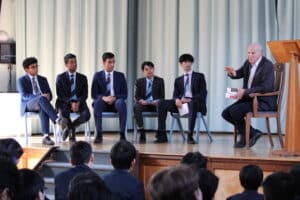 Assessing how the General Election may go overall, he said that a Labour government seems the most likely at present, but that it was entirely possible that it would not have the big majority that some, taking their cue from opinion polls, are assuming.
Assessing how the General Election may go overall, he said that a Labour government seems the most likely at present, but that it was entirely possible that it would not have the big majority that some, taking their cue from opinion polls, are assuming.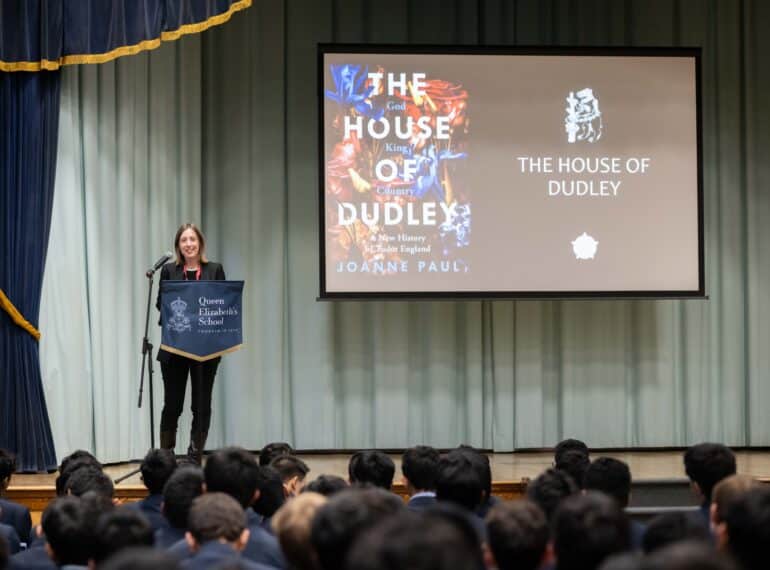
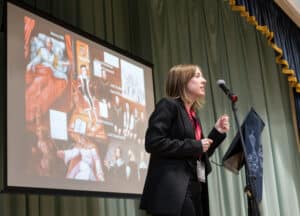 Dr Paul, author of the acclaimed 2022 book, The House of Dudley, delivered a lecture assembly to Years 8 & 9, before conducting a source-based workshop to A-level historians.
Dr Paul, author of the acclaimed 2022 book, The House of Dudley, delivered a lecture assembly to Years 8 & 9, before conducting a source-based workshop to A-level historians.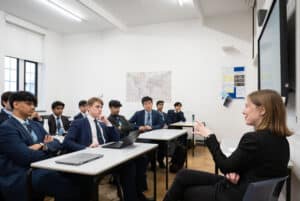 Headmaster Neil Enright said: “We are tremendously grateful to Dr Paul for giving us her time and providing these insights into the family as we wrap up our anniversary year. It seems clear that without the Dudleys, not only would Queen Elizabeth’s School not exist, but neither would the Tudors – or not as we know them, in any case.”
Headmaster Neil Enright said: “We are tremendously grateful to Dr Paul for giving us her time and providing these insights into the family as we wrap up our anniversary year. It seems clear that without the Dudleys, not only would Queen Elizabeth’s School not exist, but neither would the Tudors – or not as we know them, in any case.”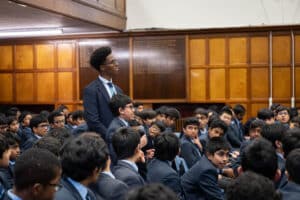 John Dudley’s success in building up the Royal Navy, as Admiral of the Fleet. He prepared it for the successes it was to enjoy in the second half of the 16th century. He added to the fleet and to the armoury, while developing Portsmouth as a great port. His military experience and leadership were important at the 1545 Battle of the Solent against the French, which, Dr Paul said, was a greater threat to England than the later Spanish Armada. John Dudley was nearly on the Mary Rose, which famously sank, but had moved across to the larger Great Harry with the king, Henry VIII.
John Dudley’s success in building up the Royal Navy, as Admiral of the Fleet. He prepared it for the successes it was to enjoy in the second half of the 16th century. He added to the fleet and to the armoury, while developing Portsmouth as a great port. His military experience and leadership were important at the 1545 Battle of the Solent against the French, which, Dr Paul said, was a greater threat to England than the later Spanish Armada. John Dudley was nearly on the Mary Rose, which famously sank, but had moved across to the larger Great Harry with the king, Henry VIII. The boys asked many questions. One wondered why so many grammar schools like QE were established under Elizabeth. Because, Dr Paul said, men such as Robert Dudley and William Cecil, her chief adviser, had received a humanist education and sought to spread that widely. Another asked why Henry VIII had had Edmund killed, given that he had brought so much money into royal coffers. She concluded that Henry probably had no personal animus against him, but that Edmund’s unpopularity made his death a good political move.
The boys asked many questions. One wondered why so many grammar schools like QE were established under Elizabeth. Because, Dr Paul said, men such as Robert Dudley and William Cecil, her chief adviser, had received a humanist education and sought to spread that widely. Another asked why Henry VIII had had Edmund killed, given that he had brought so much money into royal coffers. She concluded that Henry probably had no personal animus against him, but that Edmund’s unpopularity made his death a good political move.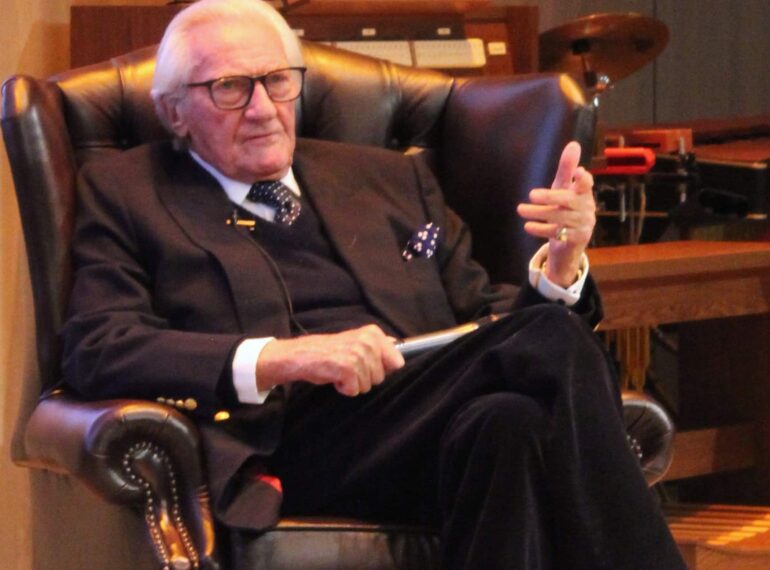
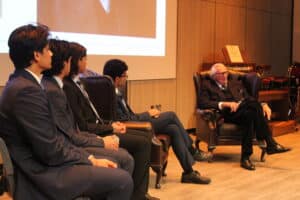 The Conservative politician, who worked directly with four Prime Ministers, spoke to a packed house drawn from all year groups in the Friends’ Recital Hall. The optional lecture, part of QE’s Flourish extra-curricular programme, was organised by Year 13 pupil Anish Kumar and the QE Politics Society.
The Conservative politician, who worked directly with four Prime Ministers, spoke to a packed house drawn from all year groups in the Friends’ Recital Hall. The optional lecture, part of QE’s Flourish extra-curricular programme, was organised by Year 13 pupil Anish Kumar and the QE Politics Society.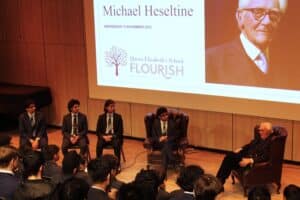 Lord Heseltine, who is 90, began his career as a property developer, before becoming one of the founders of the Haymarket publishing house. He served as a Conservative Member of Parliament from 1966 to 2001, when he was created a life peer.
Lord Heseltine, who is 90, began his career as a property developer, before becoming one of the founders of the Haymarket publishing house. He served as a Conservative Member of Parliament from 1966 to 2001, when he was created a life peer.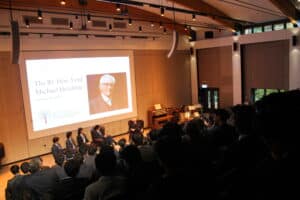 In his lecture, he covered topics ranging from industrial strategy (a particular interest and area of expertise of his) and the revitalisation of the city of Liverpool (with which he has a special, and perhaps unique, relationship as a Conservative politician), to devolution. Famously a supporter of the European Union and opponent of Eurosceptics, he expressed his desire to see the UK return to the EU fold in the future.
In his lecture, he covered topics ranging from industrial strategy (a particular interest and area of expertise of his) and the revitalisation of the city of Liverpool (with which he has a special, and perhaps unique, relationship as a Conservative politician), to devolution. Famously a supporter of the European Union and opponent of Eurosceptics, he expressed his desire to see the UK return to the EU fold in the future.